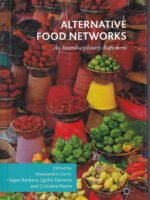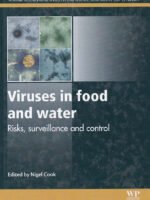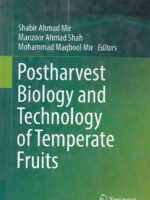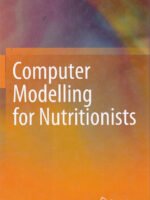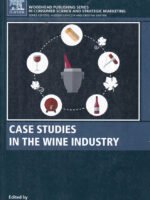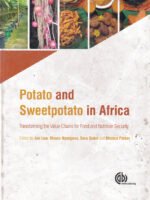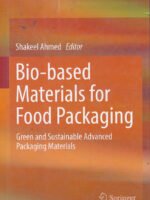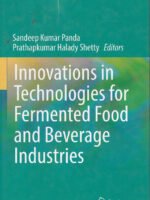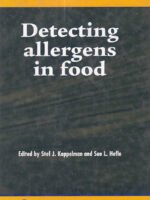-
Nutrients and Cell Signaling
₹10,668.00Cell signaling is at the core of most biological processes from the simplest to the most complex. In addition to unicellular organisms possessing the essential ability to receive inputs with regard to nutrient availability and noxious stimuli, the cells in multicellular organisms require signaling from adjacent, as well as distant cells to maintain normal internal function, including growth, differentiation, and homeostasis.
₹24,350.00 -
Functional Foods
₹8,980.00The Appendix contains laboratory exercises aimed at those using this book in a classroom situation.Functional foods: principles and technology is an essential guide for all those studying and working with functional foods.
₹21,250.00 -
Vitamin-Binding Proteins: Functional Consequences
₹9,771.00Diverse in chemical nature, water soluble and lipid soluble vitamins are essential micronutrients that react with specific protein entities and are transported to sites for participation in intracellular events, both at the genomic and non-genomic levels. Thus, metabolic pathways and intracellular signaling are influenced by vitamins or their derivatives through vitamin binding to specific proteins.
₹17,999.00 -
Alternative Food Networks
₹7,393.00The authors explicitly take an interdisciplinary approach to analyse AFNs from different perspectives, using as an example the Italian region of Piedmont, a particularly interesting case study due to the diffusion of AFNs in the area, as well as due to the fact that it was in this region that the ‘Slow Food’ movement originated.
₹14,024.00 -
Swainson’s Handbook of Technical and Quality Management for the Food Manufacturing Sector
₹8,514.00This book provides insights and guidance on the “Applied Practice” of Industrial Quality and Technical Management, written from the perspective of the industry practitioner. “Knowing what to do is half of the challenge, but being able to then make it happen is crucial” – a fact which is often less well considered in food sector information resources.
Split into two sections, the book first reviews generic aspects of Food Quality and Technical Management activities with particular regard to: Food Sector Challenges and the Role of Technical and Quality Management; Defining Technical and Quality Standards; The Food Safety and Quality Management System; Raw Materials and Packaging Supplier Control; Site Standards; Product Control and HACCP Considerations; Operations and Process Control; Personnel Control; Audits; Non-Conformance, Recall & Crisis Management; Managing the Technical Department.
In the second part of the book Guest Authors share their expertise on a range of specialist topics, providing significant breadth and depth to the content which includes: Review of Third party audit schemes; Insights into supplying supermarkets with regard to good technical and quality management practices; Enforcement authority perspectives on the food manufacturing sector. Also covered are the specific sector challenges of food quality and safety assurance in Fruit and vegetables; Herbs and spices, Cereals, Baked products, Canning and “Cook – Chill” Ready Meals, Soups and Sauces.
- Compiled expertise of food sector specialists with extensive industrial experience.
- Edited by an industry and academic expert with over 25 years experience of technical and quality management in the food sector.
- Contains Technical and Quality Management information that is relevant to a wide range of sectors in the food industry.
- Also examines Technical and Quality Management practice in specific food applications and reviews relevant compliance standards.
₹12,945.00 -
Foodborne Parasites (Food Microbiology and Food Safety)
₹9,824.00The volume examines protozoa and their subgroups: the amoeba, coccidia, flagellates and ciliates. Chapters also address Trypanosoma cruzi, recently recognized as an emerging foodborne protozoan. The helminth section is expanded to cover teniasis, cysticercosis, hydatidosis, and the trematodes and nematodes including Angiostrongylus, which is present worldwide. Finally, the editors examine the burden and risk assessment determinations that have provided a scientific framework for developing policies for the control of foodborne parasites.
₹18,350.00 -
Polyunsaturated Fatty Acid Metabolism
₹5,710.00This book captures these findings in a manner that marks the state-of-the-art, placing them in the wider context of PUFA metabolism and nutritional science.
Users will find a comprehensive discussion on the topic that presents the contributions of leading researchers who combine their knowledge to create a cohesive academic resource for researchers, those involved in production, and health policymakers.
- Provides a comprehensive view of polyunsaturated fatty acid metabolism
- Describes underlying metabolism on lipids that include polyunsaturated fatty acids
- Includes discussions on recent findings on the genetic and epigenetic regulation of polyunsaturated fatty acid metabolism
₹10,850.00 -
Viruses in Food and Water: Risks, Surveillance and Control
₹12,665.00Viruses can be highly infectious and are capable of causing widespread disease outbreaks. The significance of viral pathogens in food and waterborne illness is increasingly being recognised and viruses transferred by these routes are important areas of research. Viruses in food and water reviews the risks, surveillance and control of food and waterborne viral disease.
₹24,250.00 -
Postharvest Biology and Technology of Temperate Fruits
₹7,879.00The volume is unique in its focus on the biodiversity, nutritional and health benefits, and postharvest technologies for shelf life enhancement of temperate fruits. Contributing authors address the postharvest biology and technology of individual temperate fruits such as plum, cherry, peach, apricot, apple, pear, quince, loquat, kiwi, persimmon and berries. There has been tremendous growth in the research and development of new techniques to maintain the quality of temperate fruits from farm to table. Contributions from experts in the field cover these recent advances, providing up-to-date and relevant information for researchers, postharvest/fruit technologists, food scientists, postgraduate students, and others working in the industry.
₹14,959.00 -
Peanut Processing Characteristics and Quality Evaluation
₹9,824.00The book goes on to examine the relationship between raw materials and the qualities of peanut protein, peanut oil and other main peanut processing products. As such, it provides a valuable reference guide for research into the raw materials, change mechanisms and control technologies used in peanut processing, laying the groundwork for the development of new disciplines in “grain and oil processing quality”. It will be useful for graduate students, researchers, and management groups from multidisciplinary audiences, covering both food science & technology and public health.
₹18,699.00 -
-
Case Studies in the Wine Industry
₹8,514.00Case Studies in the Wine Industry aims to close the gap between academic researchers and industry professionals through real world scenarios and field-based research. The book explores how consumer and sensory science has been implemented in the wine industry to achieve certain goals, including the rejuvenation of product image, the shaping of new market places, the achievement of market differentiation and geographical diffusion, the achievement of customer loyalty, and the promotion of traditional features of the product.
₹12,945.00 -
The Rise of Food Charity in Europe
₹5,788.00They build into a rich comparative study that delivers valuable evidence for anyone with an academic or professional interest in related issues including social policy, exclusion, poverty and justice.
₹8,751.00 -
Potato and Sweet potato in Africa
₹7,951.00Sweetpotato and potato are expanding faster than any other food crops in sub-Saharan Africa. There is growing investment in research to address bottlenecks in value chains concerning these two crops, and growing interest from the private sector in investing in them.
₹14,599.00 -
Bio-based Materials for Food Packaging
₹8,365.00It is intended as a reference book for researchers, students, research scholars, academicians and scientists seeking biobased materials for food packaging applications.
₹15,894.00 -
Innovations in Technologies for Fermented Food
₹10,796.00This book covers innovations in starter culture, production of health beneficial fermented food products, technological intervention in beer, wine and spirits production, marketing of alcoholic beverages, modernization of dairy plants for production of fermented dairy products, non-diary probiotics, development of automatic fermenters, and packaging technology.
₹20,569.00 -
Keys to the Tropical Fruit Flies of South-East Asia
₹8,397.00A companion volume to Tropical Fruit Flies of South-East Asia (Tephritidae: Dacinae), this book provides fully-illustrated keys for the identification of all currently-known Dacinae fruit flies. Focusing on south-east Asian fauna, it covers areas including India, Bhutan, Nepal, Sri Lanka, Myanmar, China, Taiwan, Japan, the Philippines, Palau, Vietnam, Thailand, Singapore, Malaysia and Indonesia.
₹15,956.00 -
Detecting Allergens in Food
₹10,611.00Food allergies are an increasing health issue in Western societies, presenting a major challenge for the food industry. As a result there has been a wealth of research into developing effective methods for detecting allergenic residues in food. Detecting allergens in food reviews the range of detection techniques and their application to all the main allergens in food.
₹25,150.00 -
-
Endocrine-Disrupting Chemicals in Food
₹11,155.00The rise in the incidence of health problems such as reproductive disorders and testicular and breast cancer has been linked by some to endocrine disrupting chemicals in the environment. The role of food in transmitting these chemicals is uncertain and a topic of considerable research. This important book addresses key topics in this area. The first part of the book reviews the impacts of endocrine disrupting chemicals on health and behaviour, with chapters on the effect of dietary endocrine disruptors in such areas as the developing foetus, cancer and bone health.
₹26,450.00
- Home
- Categories
- Architecture
- Agriculture and Farming
- Business & Management
- Engineering
- Fashion & Textiles
- General and References
- Humanities & Social Science
- Islam
- Library Science
- Literature & Literary Studies
- Mathematics & Statistics
- Media, Information & Communication Industries
- Medicine
- New Arrivals
- On Sale
- Science & Technology
- Sports
- Top Selling
- Travel & Tourism
- Annual Reviews
- Exclusive
- Blog
- Others



